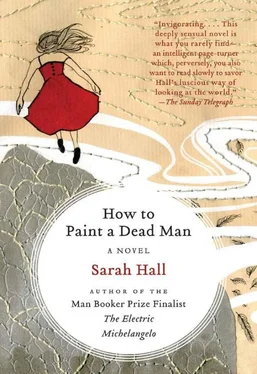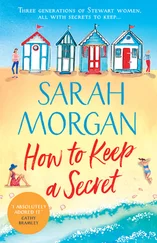Sarah Hall - How to Paint a Dead Man
Здесь есть возможность читать онлайн «Sarah Hall - How to Paint a Dead Man» весь текст электронной книги совершенно бесплатно (целиком полную версию без сокращений). В некоторых случаях можно слушать аудио, скачать через торрент в формате fb2 и присутствует краткое содержание. Год выпуска: 2009, Издательство: Harper Perennial, Жанр: Современная проза, на английском языке. Описание произведения, (предисловие) а так же отзывы посетителей доступны на портале библиотеки ЛибКат.
- Название:How to Paint a Dead Man
- Автор:
- Издательство:Harper Perennial
- Жанр:
- Год:2009
- ISBN:нет данных
- Рейтинг книги:4 / 5. Голосов: 1
-
Избранное:Добавить в избранное
- Отзывы:
-
Ваша оценка:
- 80
- 1
- 2
- 3
- 4
- 5
How to Paint a Dead Man: краткое содержание, описание и аннотация
Предлагаем к чтению аннотацию, описание, краткое содержание или предисловие (зависит от того, что написал сам автор книги «How to Paint a Dead Man»). Если вы не нашли необходимую информацию о книге — напишите в комментариях, мы постараемся отыскать её.
, Sarah Hall, "one of the most significant and exciting of Britain's young novelists" (
), delivers "a maddeningly enticing read... an amazing feat of literary engineering" (
).
How to Paint a Dead Man — читать онлайн бесплатно полную книгу (весь текст) целиком
Ниже представлен текст книги, разбитый по страницам. Система сохранения места последней прочитанной страницы, позволяет с удобством читать онлайн бесплатно книгу «How to Paint a Dead Man», без необходимости каждый раз заново искать на чём Вы остановились. Поставьте закладку, и сможете в любой момент перейти на страницу, на которой закончили чтение.
Интервал:
Закладка:
He loves you. He has not stopped loving you since you first got together. In the last few weeks he’s been trying gently to manage you, trying to corral your grief, and provide support. He speaks quietly, as if not to spook you. He calls you regularly throughout the day, brings home flowers, cleans the house, cooks. He has not pushed you on any of the issues that must seem alarming to him as an informed observer. The meat-eating. The bitchery. The hours spent at the gallery in the evening when you should be home. The times you’ve gone running so hard on the heath you’ve made yourself vomit. He’s worried, of course he is, about your health, your state of mind, the way your brother’s accident has stripped you of your usual spirit. He’s worried about the disappearance of the woman he knows. He doesn’t say, Darling, why don’t you see someone about being depressed, or, Really, you should finish the work for the Trust, or, Susan, please come back to me. Nor does he cry in front of you, though you know he loved your brother too, and misses the times they stayed up late drinking whisky and playing cards, or watching Bond reruns, the times they biked the trails, or walked either side of you up the fells. He has not unpacked his grief.
You exist just outside the life you have with Nathan. It isn’t your life any more. Within is the choreography of eating and sleeping and paying bills, the mechanics of being together in a relationship, which has nothing to do with who you are. The man you live with is a kind stranger.
If Danny were told about all this, if by some miraculous paradox Danny could be drawn from the dark ether into which he has been vented and rearranged around his old anatomy and then told about your response to his death, he would get it. He would smile in that broad, puerile way of his, or laugh, or put his arm around you and say, Lighthouse extinguished, Captain. The rocks! The rocks! or something equally endearing and childish. The awful irony is that he’d be the one person to truly sympathise. By which you don’t mean just accept poor old you, having it hard, missing him and messing up your life. No. Danny would have an exact perspective, a clear understanding of how it is to be you. If Danny were alive, he wouldn’t need to be told what was wrong. He would simply know. Your little brother was cleverer than anyone gave him credit for. He didn’t exhibit those unhealthy verbal symptoms or throw fits about swapping milk beakers. He didn’t have to see Dr Dixon for any sessions. He was the quiet one, the dummy, ‘the secondary’ in a way, he held all the power.
It’s hard to explain this connection. Kids at school would ask you to read each other’s minds. What’s Danny thinking, Suze? What colour are your sister’s knickers, Dando? Woooh, can you levitate this pencil case between you? Can you feel her bits? As if the two of you were holding private séances.
Maybe it’s best described like this. You have always liked fire. In the cottage where you were brought up you were the one who kept watch over the hearth, clearing the grate in the morning, stoking the coals before dinner, and smooring the embers at night. You hated anyone else poking it, which your dad often did, as dads often do. He would tell you off as a kid for building the fire too high, being wasteful with the wood and coal, which he had to shovel, chop and stack. You’ll start a chimney blaze and kipper me paintings, Suze! You weren’t a pyromaniac; it wasn’t about the thrill of conjuring up that thin, vigorous spirit and unleashing its ravenous appetite. It was the history you’d had with it.
You were never afraid, not since the moment you crawled over to the pretty sparking hearth when the guard was down, put one chubby fist in towards the flames and removed a burning stick by its un-charred end. You were still holding it a minute later when your mum arrived and dropped her washing basket. Oh poppet, poppet, be careful, she said, walking with soft haste towards you. As your head turned towards her the torch drooped and touched your leg. Then you understood what that red synaptic bloom was. It was pain, seen. It was how pain looked outside the body. There’s still a scar, silky and white, like a spider’s nest, above your kneecap.
It was your brother who cried the loudest and made the most fuss though. He squalled and wrung out his eyes in the next room, blind to the events but no less invested in the trauma. Bur bur bur, he yelled. Suzeeeee. He screamed and bawled and rubbed the wound until your mum went to him, lifted him up, and doused his knee with cold water. That was the first time there was clear evidence.
Afterwards, Danny was nervous. Any time a spark cracked in the fire and missiled out on to the rug, or later when a hot rock fell from a joint into his lap, he would stamp and flap and batter until the tiny smut went out. In contrast, you picked shooters up between your thumb and forefinger and flicked them back over the grate. At teenage parties you would pass your hand through a candle flame at the exact possible slowness for it not to burn you, while Danny panicked and clattered the wax stem to the floor. He was anxious, but giddy around fire. He loved it when you lit the whin bushes on the moor, or made bonfires, or held a lighter to the straw scarecrow belonging to the farm next door. He liked watching you lay fires in the cottage, aiding the draw with a sheet of newspaper, the orange eye brightening behind the events of the world. When the newsprint turned brown and flamed to life, you punched the paper up the chimney, and Danny blinked and blinked, and left the room, and then came back in.
Now he is gone, and you are here, trying to find yourself in the mess, trying to locate the intimate filaments of which you are comprised. So that from this chaos order is achieved. So that you might be restored. To summarise: you are, or were, a twin. You like fire, veal, the seagull-shaped mouth of the man you are fucking when it dips below your navel and preens in the emulsion of you. You don’t find comfort in books. Your name is known in the art world, because you are relatively talented, and because you are your father’s daughter. You have your mother’s teeth, her black and topaz moles. You were the embryo on the left side of her uterus, the embryo fate was kind to. Your brother rode his mountain bike the wrong way up the motorway one night and was killed. You are alive, somehow, continuing to pulse, continuing to breathe.
Translated from the Bottle Journals
Theresa has brought a fine array of mushrooms this week and, as a special gift from her husband, Giancarlo, two good-sized truffles, which she has grated on to her omelettes. Their little dog has had a busy season in the forest so far. I was invited to the morning gatherings, but it has been impossible. My chest is suffering in the colder air and last year’s cough has returned with renewed vigour. Soon I will need to use the oil heater in the studio. I miss such excursions. I’ve always enjoyed the muttering of the forest as it prepares to disrobe, and the smell of the old earth being turned when the dogs begin to dig.
The olive groves on the slopes have almost finished preparing their fruit. I can see the leaves fluttering-dark green, light green and silver. Soon they will be stringing the nets. Perhaps I might have gone with Giancarlo and the others. I should make an effort not to become sedentary. There is a paralysis of the mind that accompanies immobility. I have seen it in friends and colleagues; intellectuals who were once fierce and deft of thought, who later became lost in conversation and fixated on small, unimportant details or phantoms in the air before them. I fear this above all else. I find cigarettes to be the most useful tools for concentration, but in this matter there are arguments with Theresa. She would prefer that I took her breakfasts instead of smoking cigarettes. She believes passionately in their ill effect and is attempting to banish them from Serra Partucci. I have noticed of late the lady of this household is becoming disinclined to produce them from her shopping basket. Often she swears she has no knowledge of any new packet or any request for a new packet. She will hoist the shopping list into the air like a flag of victory and wave it in the face of her old ward.
Читать дальшеИнтервал:
Закладка:
Похожие книги на «How to Paint a Dead Man»
Представляем Вашему вниманию похожие книги на «How to Paint a Dead Man» списком для выбора. Мы отобрали схожую по названию и смыслу литературу в надежде предоставить читателям больше вариантов отыскать новые, интересные, ещё непрочитанные произведения.
Обсуждение, отзывы о книге «How to Paint a Dead Man» и просто собственные мнения читателей. Оставьте ваши комментарии, напишите, что Вы думаете о произведении, его смысле или главных героях. Укажите что конкретно понравилось, а что нет, и почему Вы так считаете.












